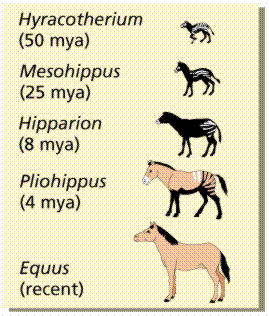|

In the life sciences, evolution is a selective process causing changes in the traits of living organisms over generations,
including the emergence of new species. Since the development of modern genetics in the 1940s, evolution has been defined
more specifically as a change in the frequency of alleles in a population from one generation to the next. In other fields
evolution is used more generally to refer to any process of change over time.
One of the first coherent theories of biological evolution was proposed in the early 19th century by Jean-Baptiste Lamarck,
though it did not meet with widespread approval. With the publication of Charles Darwin and Alfred Russel Wallace's joint
paper in 1858 followed by Darwin's book Origin of Species in 1859, the theory of evolution by natural selection became firmly
established within the scientific community and rapidly caught the public imagination. In the 1930s, work by a number of scientists
combined Darwinian natural selection with the re-discovered theory of heredity proposed by Gregor Mendel to create the modern
evolutionary synthesis. In the modern synthesis, "evolution" means a change in the frequency of an allele within
a gene pool. This change may be caused by a number of different mechanisms: natural selection, genetic drift or changes in
population structure (gene flow).
In common parlance the word "evolution" is often used as a shorthand for the modern synthesis of evolution,
including the theory that all extant species share a common ancestor. It also is often used to describe the mechanisms through
which evolution acts to change populations over time.
|

